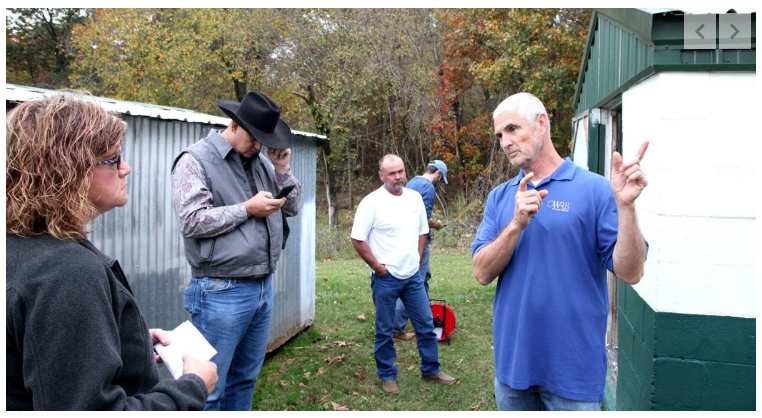Tulsa World: ‘I think we’ll sell’: Latest chicken house is final straw for Watts-area homeowner
by Kelly Bostian Tulsa World | December 22, 2018
The state’s suspension on poultry house registrations didn’t save them, and now Leon and Tammy Scott say they’re going to move.
“Yes, I think we’ll sell,” Leon Scott said Friday morning as he noticed a “shavings truck” arriving at six houses built directly across the road from his home in recent months.
“It’s a new one not even in operation yet,” he said. “They’re delivering shavings so that probably means they’ll be loaded up with chickens pretty soon.”
After public outcry from people like the Scotts, the Oklahoma Department of Agriculture, Food and Forestry announced a suspension on new poultry operation registrations Oct. 8, but two applications caught in the suspension were considered “pending.” One of those was just down the road from the Scotts’ home.
The Scotts joined more than 100 local residents in berating Oklahoma Board of Agriculture members at a November meeting that came at short notice after the board said it planned to consider the applications. Scott did not speak at that meeting but said his neighbor, Rod Garman of Ground Zero Farms, represented his view in telling the board they’ve allowed the farms to become too concentrated and too close to homes.
“That was a pretty good meeting,” he said. “Except for the four people sitting up in the front of the room.”
The Scotts held on to a thin hope that the suspension would last until the Oklahoma Legislature might pass new rules that would address the problem, he said.
In spite of the state’s suspension — in effect Oct. 8, 2018 to May 31, 2019 — a farm registered to Nhien Ha was approved on Dec. 12. It will have six houses and 282,000 chickens and will be about three-quarters of a mile west of the Scott home.
This is the last straw, he said. In the past two years, the state has allowed operations to add 1.3 million more chickens to the area within 1.5 miles of his house — bringing the total to 2.7 million, he said.
Nearly surrounded by chicken houses now, only a south or southeast wind would give the couple respite from the smells. County roads already are threadbare near their home and with added operations will become worse. Last year, they started having problems with their well water and they switched to rural water supply, which costs $50 to $70 a month, he said.
Jeremy Seiger, director of agricultural environmental management with the Agriculture Department, said one of the pending registrations for Delaware County was deemed incomplete and is suspended but the registration submitted by Nhien Ha was, essentially, caught up in the process leading up to the suspension.
The registration was originally filed in August but was reviewed and turned back for “completeness and accuracy,” he said.
Those errors were fixed and it was submitted on Oct. 3, but by that time the department was discussing the suspension, he said.
“In reality it should have been issued before Oct. 8,” Seiger said. “According to our legal folks and discussions we had in the office, we were subject to legal action if we did not issue the permit and if we had been sued, we probably would have lost.”
The reasoning holds no weight with people like the Scotts, who believe the state has been negligent in allowing the influx of houses, most tied to Arkansas owners and integrator Simmons Foods, which is building a new and expanded production plant between Decatur and Gentry, Arkansas.
Nearly 1 million birds in the Scott Butler operation to the west and northwest of the Scotts’ home were registered in 2004 and were in place prior to the purchase of their home, he said.
“We knew what we were getting into with them when we bought the house and we have no issues with them,” he said. “But no one could imagine all these years later they would just let others come in here and cover the countryside with these houses … The two operations straight north of my house here aren’t but about 100 yards apart.”
After a pending back surgery and recovery time, Leon Scott said the house will be officially up for sale but that they’re not going to just let the house go, either.
“We’ve got a lot of sweat-equity in this house making it what it is today,” he said. “I’m not going to let it go for cheap.”
